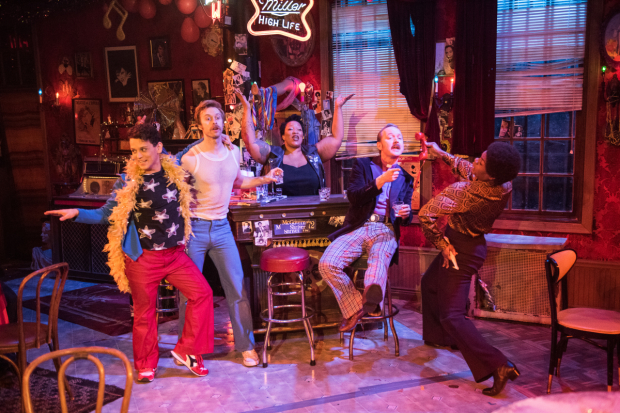
(© Kurt Sneddon)
The Lynn Redgrave Theater is now the home of the tackiest, most fabulous gay bar there ever was. The red walls are covered with framed photos of gay icons: Walt Whitman, Oscar Wilde, Divine. A decoupage piano occupies one corner of the room. A nude cutout of Burt Reynolds reclines on high, like an uncommonly hirsute angel in a Renaissance cathedral. Jason Sherwood has spared no detail in the creation of this environmental set, going so far as to mount a leather studded jockstrap outside the bathroom. This is the UpStairs Lounge, the kind of magical gay bar where there's something for everyone. It's also the setting of Max Vernon's poignant and somewhat tortured new musical, The View UpStairs.
Gay history buffs will recognize the UpStairs Lounge as a real bar that once graced the French Quarter of New Orleans. Until the Pulse Nightclub massacre last year, it also had the dubious distinction of being the sight of the worst mass murder of gay Americans, a 1973 arson attack that left 32 people dead. The event is now mostly forgotten; we prefer to commemorate the more uplifting story of the Stonewall Inn instead.
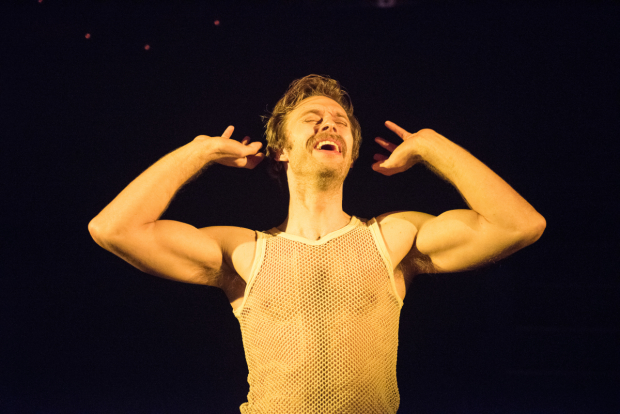
(© Kurt Sneddon)
Vernon, who wrote the book, music, and lyrics, valiantly combats our collective amnesia with this memorable (if not particularly sophisticated) new musical. He introduces us to a cast of fictional denizens of the UpStairs Lounge: There's piano man Buddy (Randy Redd), tiny drag queen Freddy (Michael Longoria), and bar proprietress Henri (Frenchie Davis, effortlessly butch and soulful at the same time). Their joyous opening number, "Some Kind of Paradise," lets us know how they feel about this sanctuary masquerading as a mere drinking establishment.
A musical about this family that chose each other would be enough, but Vernon goes a step further by dropping a gay fashion designer from 2017 into the action: Wes (Jeremy Pope) has just purchased the dilapidated space and hopes to transform it into his new boutique. As soon as he starts renovating, he is transported back in time, where he has all kinds of funny, awkward, and enlightening misunderstandings with his gay forebears. It's like a queer spin on A Connecticut Yankee in King Arthur's Court.
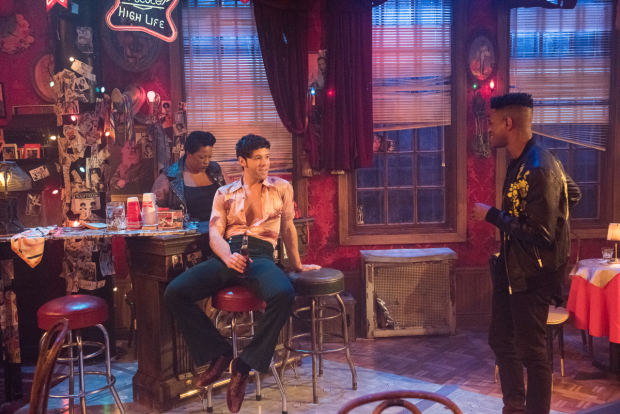
(© Kurt Sneddon)
While this conceit might seem like a good way to bridge the generational divide, it has the disadvantage of putting far too much attention on Wes, a charmless protagonist dredged from the bowels of Hell's Kitchen, a role which Pope physically and vocally embodies with relish. When cute hustler Patrick (Taylor Frey) asks Wes to go home with him, Wes refuses, stating that he never sleeps with someone without first exchanging multiple nude photos. He also can't stop talking about his Instagram and brand recognition. It's hard to care about this budding romance when we know that Patrick could do better.
We get far too much of Wes, but we cannot get enough of "old queen" Willie, played by a scenery masticating Nathan Lee Graham. He's like Eartha Kitt and Shirley Bassey rolled into one. He always ends a line on a flourish, as if every sentence deserves a production number in lieu of a period. Armed with the essential prop of a hand fan, he gives face, face, face throughout, keeping us in hysterics with a performance that is completely authentic in its extravagance.
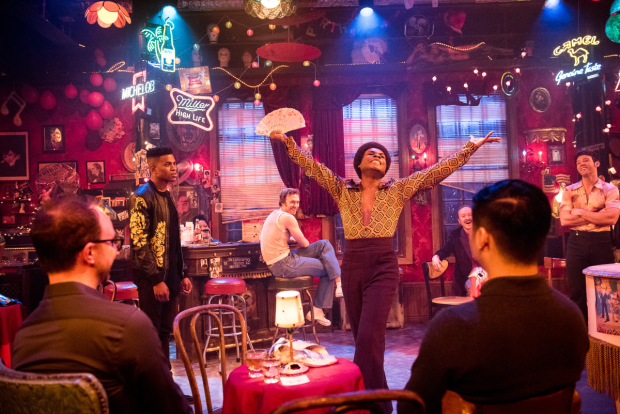
(© Kurt Sneddon)
But it's not all about Willie. Vernon is egalitarian in his songwriting, giving everyone a number (although not all are of equal quality). Gay church pastor Richard (Benjamin Howes) leads the catch-all "I want" song, "Are You Listening God?" Freddie and his mom, Inez (Nancy Ticotin), prepare for an impromptu (and inexplicable) drag show in "Completely Overdone." Bar misfit Dale (an achingly tragic Ben Mayne in a white mesh shirt) sings about his invisibility in "Better Than Silence," a song that addresses one stigma in the gay community that we've never really gotten over: poverty.
As fun and informative as these songs are, we can never quite escape the sense the playwright-composer is desperately trying to get us to learn something from this experience, making the whole enterprise feel like a gay afterschool special. In a more cleverly written musical, the learning would be effortless.
Director Scott Ebersold tries to offset the effects of Vernon's musical lecture with a semi-immersive staging that pulls us into the world of the bar, allowing us to experience gay life in the 1970s, rather than just hear about it. Anita Yavich outfits the cast in surprisingly attractive and well-tailored '70s styles. Hair designer Jason Hayes has most of the men in thick mustaches, giving them a period look that is suddenly fashionable today.
Despite its flaws, The View UpStairs is mostly enjoyable and carries with it a timely and important message. A monologue about the potential backslide of LGBT rights in our own time comes like a rallying cry: Put down the Grindr and get thee to a gay bar, preferably one with a piano where our voices can be raised in song; this is a community and a pastime that need not, must not die with the digital revolution.
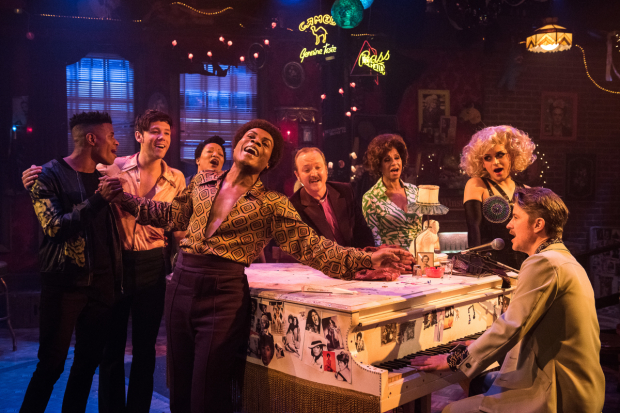
(© Kurt Sneddon)









